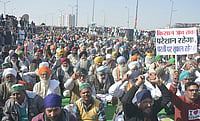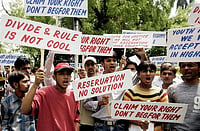Amid protests and counter-protest over proposed judicial overhaul, Israeli President Issac Herzog on Sunday met Prime Minister Netanyahu as part of last-ditch efforts to strike a compromise over the bills that have torn the country.
Later in the day, Herzog is scheduled to meet Leader of Opposition Yair Lapid, who served as the Prime Minister of Israel. Lapid too has called for a compromise and supports the efforts facilitated by the President of Israel.
Hundreds of thousand have gathered in Jerusalem and Tel Aviv in protest and in support of the proposed judicial overhaul helmed by Netanyahu. The overhaul, which largely concerns the scope of judicial scrutiny, has polarised Israel to the extent that even the country's famed military and intelligence services stand divided. The division in the most respected institutions of the Israeli society could push the country into existential peril, said Israel Defense Forces (IDF) chief Lt. Gen. Herzi Halevi.
Even several individuals supportive of judicial reforms say the Netanyahu's bills, helmed by the most right-wing government in Israel's history, are just too extreme and need to be watered down to be considered.
An agreement must be reached: Herzog
President Herzog, who has just returned from a state visit to the United States, said that an agreement must be reached.
After holding a meeting with Netanyahu at the hospital, where he is resting after a pacemaker transplant, he is set to meet Leader of Opposition Lapid later in the evening. Earlier this year, the two sides engaged in the negotiations facilitated by Herzog. Those negotiations failed.
"This is a time of emergency. An agreement must be reached," said Herzog.
There are voices within the Israeli ruling coalition too that favour a compromise. The leading voice is that of Defence Minister Yoav Gallant, a senior member of Netanyahu's Cabinet. He has suggested that the government should extend the current parliamentary session to have more time to build a consensus. This would also give more time to come to a compromise.
"Mr. Gallant’s office released a statement late Friday, in light of the reports, saying that he was 'taking measures in order to reach a wide consensus, and in order to ensure the security of the state of Israel', while leaving the military out of the political discourse," reported The New York Times.
Israel could face existential peril: Defence chief
The Israeli spy agency Mossad and its military, formally called the Israel Defense Forces (IDF), are the most respected Israeli institutions.
The extent of the polarisation is such that even these institutions stand divided. Thousands of reservists have announced that they would refuse to answer the call of duty if Netanyahu's proposed legislations go ahead. IDF chief Lt. Gen. Herzi Halevi has said that Israel would be in existential peril without a unified IDF including the “best” soldiers, according to Times of Israel (ToI).
In a letter in Hebrew to soldiers, Halevi said that it's their duty to not let the cracks within the military widen, reported to ToI.
"If ours is not a strong and unified army, and if the best do not serve in the IDF, we will not able to continue to exist as a state in the region...We have acted to keep [the IDF] out of the debate, but due to its intensity in Israeli society, we were pulled into it, and the cohesion [of the military] has been harmed...It is our duty to prevent these cracks from widening," said Halevi, as per ToI.
Opposition's offers for compromise
While President Herzog mediates between Netanyahu and the Opposition, the Opposition leaders have separately said that the government should stop and hold talks.
Leader of Opposition Lapid has said that they did not protest to declare war, but to prevent one, according to The Jerusalem Post, and further said that the Opposition is willing to take part in talks facilitated by the President of Israel.
Lapid said, "If you meant a single word you’ve said about national unity, stop. If you stop, we’re here. We talked to the President’s Residence. The doors there are open, waiting for us all. Waiting for us to come back and talk to prevent a disaster. To prevent the disintegration. To prevent an extreme minority from seizing control of the lives of the Israeli majority.
I want to tell the government of Israel, from this podium, we don’t want to defeat anyone, because then we all lose. The truth is everyone wants a compromise, but nobody knows how to reach one or what it’ll look like. There’s only one way to find out: to keep trying. To stop the legislation. To go to the President’s Residence. Our legs will pray the whole way there. We need to go there and argue, fight, and speak again and again and not stop trying, because Israel’s fate depends on it."
Fellow Opposition leader MK Benny Gantz, repeated his proposal from last week to immediately enter talks over the reasonableness standard bill and pass it into law, and then over the rest of the judicial reform via consensus only, reported The Post, adding that, however, agreeing to a compromise on the reasonableness standard bill without a commitment to consensus on the rest of the legislation would achieve nothing.
What are proposed changes, why are they so controversial?
Netanyahu has proposed a set of laws that would restrict the powers of the Supreme Court.
The supporters over the bills say it would restore the balance of power between the Executive and the Judiciary as, as per them, the Judiciary has over the years encroached into the domain of the Executive. The critics, however, say that the independence of the Judiciary would be compromised and would pave way for autocracy.
These are the proposed changes:
In an article for Slate, Bradley Burston and Dahila Lithwick note that Netanyahu's reforms would bring following changes:
- Requirement of a super-majority of the Supreme Court —up to 80-100 per cent— to strike down any legislation
- Parliament could overturn Supreme Court judgement with simple majority
- Israel's Basic Laws —equivalent of Constitution— immune from judicial review
- Give politicians more control of appointment of judges
- Amending corruption laws that address two of the three cases against Netanyahu
"The proposal would also grant immunity to prime ministers, ministers, and members of the Knesset 'for any crime they might commit in relation to their position while in office'. So that's awesome," noted the Slate article.
The critics of the Netanyahu's proposed judicial overhaul highlight that Israel does not have a proper separation of powers that could isolate Judiciary or Executive or Legislature from each other. They further point out that Israel does not have a system of checks and balances on Executives' powers. A weakened Judiciary could thus pave way for autocracy, as per this line of thought.
Notably, Israel does not have a Constitution. A set of laws called Basic Laws are the equivalent of the Constitution.
In their article for Slate, Burston and Lithwick highlight such absence of checks and balances:
- No bicameral Legislature that could add more dialogue to policymaking and balance power among parties
- No US-style federalism where powers are divided carefully between states and federal government
- No separation between Legislature and Executive as Executive is drawn from Legislature
- No charter of rights like Canada despite borrowing Canada's 'override' clause
- No formal Constitution
Dan Arbell of Washington DC-based American University highlights it's said the overhaul undermines features that have defined Israel its founding.
"The plan calls for near total control over future laws, constitutional amendments and judicial appointments to be concentrated in the hands of the governing coalition in the Knesset. Critics and protesters say the plan undermines the 75-year delicate balance between the three government branches, ends liberal democracy as they know it and pushes Israel towards autocratic rule," writes Arbell for The Conversation.


























